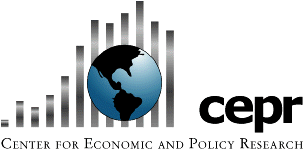
Polling and the Ballot: The Venezuelan Referendum
By David Rosnick1
August 19, 2004
1. Was the Referendum Too Close to Call?
On August 15, a national referendum took place in Venezuela. Voters were to decide whether or not to recall their twice-elected President Hugo Chávez. Several polls in the run-up to the referendum showed Chavez to be the likely winner; the most recent (August 4-8) and comprehensive was the poll by Evans/McDonough Company, Inc., with Varianzas Opinion. With a nationwide sample of 2000 and a margin of error of 2.2 percent, it showed Chavez ahead by 50 to 38 percentage points among registered voters (up from 49-41 in July). If we assume that the undecided split along similar lines, this turns out to be very close to the actual result, and within the poll's margin of error.
But most news reports said the election was "too close to call."2
President Chávez won with 58 percent of the vote-a result confirmed by the Carter Center and the Organization for American States as accurate and without evidence of fraud.3 This leads to a statistical question: how likely is it that a random sample of the electorate polled before the election would find the result "too close to call?"
According to the National Electoral Council (CNE), 4,991,483 votes (or 58.26% of the total) were cast in to reconfirm Chávez, while 3,576,517 votes (or 41.74%) were cast to recall him.4 Table 1 shows the probability, for various sample sizes, of an accurately constructed poll coming within the margin of error of an even outcome.

As can be seen from the table, it was relatively easy to predict the result of this election. With a representative sample of 1000 people, the odds of being unable to call the election would be less than 1 in 2000; with a sample of 2000, the odds of being unable to call the election would be less than 1 in 50 million.
2. The Penn, Shoen, Berland and Associates Exit Poll
Despite an internationally certified Chávez victory, leaders of the Venezuelan opposition are refusing to accept the outcome, alleging massive fraud.5 As support for their claim, they cite an exit poll conducted by Penn, Schoen & Berland Associates, Inc. of more than 20,000 voters. This firm reported that their poll showed 59 percent in favor of recall.6 With such a large sample, the margin of error was only 1 percent. The chance of a properly constructed survey resulting in such an error is incomprehensible- far less than 1 chance in 10 to the 490th power.7
Given that international observers found no evidence of fraud, the
methodology of this exit poll must be called into question. It is nearly
impossible that this result could have been obtained through sampling error.
Appendix
Imagine sitting down at a poker table with three friends. A normal deck is shuffled and five cards are dealt to each. You and your friends all find yourselves with royal flushes (A-K-Q-J-10 of the same suit.) Upon discovering this, you would not think of the incredible luck involved- you would rightly figure the deck had been stacked. Now imagine the deck is reshuffled and re-dealt and again you all hold royal flushes. Now imagine it happening nineteen more times in a row! That is a more likely scenario than the Penn, Schoen & Berland exit poll having missed the outcome of the recall vote by such a wide margin by random chance. It is more likely that the same person wins the lottery every week of the year!
The odds of Penn, Schoen, and Berland getting their result from sampling error are many times less than 1 chance in:
10,000,000,000,000,000,000,000,000,000,000,000,000,000,000,000,
000,000,000,000,000,000,000,000,000,000,000,000,000,000,000,
000,000,000,000,000,000,000,000,000,000,000,000,000,000,000,
000,000,000,000,000,000,000,000,000,000,000,000,000,000,000,
000,000,000,000,000,000,000,000,000,000,000,000,000,000,000,
000,000,000,000,000,000,000,000,000,000,000,000,000,000,000,
000,000,000,000,000,000,000,000,000,000,000,000,000,000,000,
000,000,000,000,000,000,000,000,000,000,000,000,000,000,000,
000,000,000,000,000,000,000,000,000,000,000,000,000,000,000,
000,000,000,000,000,000,000,000,000,000,000,000,000,000,000,
000,000,000,000,000,000,000,000,000,000,000,000,000
“Exit Poll Results Show Major Defeat for Chavez.” Penn, Schoen & Berland
press release. Aug. 15, 2004.
See also “Venezuelans Flock to the Polls to Vote on a Divisive President”.
By Carol J. Williams. Los Angeles Times. Aug. 16, 2004.
Footnotes:
[1] David Rosnick is a Research Associate at the Center for Economic and Policy Research. We thank Todd Tucker for his input.
[2] For Example, “Venezuelan political rivals wrap up campaign for recall referendum with no clear leader” By Alexandra Olson. The Associated Press. August 13, 2004;
“Crude ends above $46 as traders eye Iraq, Venezuela” By Myra P. Saefong. CBS MarketWatch. August 13, 2004;
“Venezuela votes to sack or back President” By David Adams. The Times. August 16, 2004
[3] "There is no evidence of fraud, and any allegations of fraud are completely
unwarranted,” Carter asserted at a news conference Tuesday. “Venezuela to Hold Partial Audit of Recall.” Associated Press. Aug. 18, 2004.
[4] Consejo Nacional Electoral. “Chávez Ratificado Con el 58 Por Ciento de los votos”. August 16, 2004. http://www.cne.gov.ve/notideta.asp?id=416
[5] “Foes Press Audit of Venezuela Recall Vote.” By Juan Forero. New York Times. Aug. 18, 2004 and “ Oposición: El CNE ejecutó una estafa.” El Nacional. Aug. 16, 2004. http://www.el-nacional.com/Articulos/DetalleArticulo.asp?idSeccion=64&id=47725
[6] “Exit Poll Results Show Major Defeat for Chavez.” Penn, Schoen & Berland press release. Aug. 15, 2004 See also “Venezuelans Flock to the Polls to Vote on a Divisive President”. By Carol J. Williams. Los Angeles Times. Aug. 16, 2004.
[7] This number is so large that we have attempted to provide some context in the Appendix.